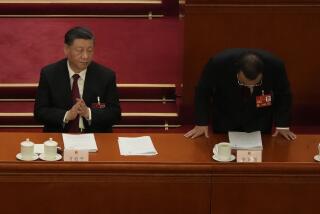China Lawmakers Show Some Opposition : Asia: A third of Parliament does not support the candidate of the party leader.
- Share via
BEIJING — In a rare display of opposition that caused nervous murmurs Friday in the Great Hall of the People here, one-third of China’s national Parliament failed to support a handpicked candidate of Communist Party leader Jiang Zemin for a senior post in the government.
But the candidate for the post of vice premier in charge of agriculture, Jiang Chunyun, still carried the day, winning election with 63% of the vote.
Meanwhile, another candidate, Wu Bangguo, a close ally of Jiang Zemin from Shanghai, was elected handily as vice premier in charge of industry, with 13% of the 2,757 delegates voting against him or abstaining.
Western diplomats here viewed Friday’s vote on the two vice premierships as a critical test of Jiang Zemin’s political support going into the succession battle that is expected to follow the death of ailing senior leader Deng Xiaoping.
As general secretary of the Communist Party Central Committee, state president and chairman of the Military Affairs Commission, Jiang, 69, holds the three top posts in China. But the former Shanghai mayor lacks the military experience normally expected of Chinese leaders and has been attacked recently for creating a “Shanghai clique” at the center of government.
The key test Friday was expected to be the vote on Wu, 53, the powerful Communist Party secretary in Shanghai since 1991. Independent Hong Kong newspapers portrayed the vote as a showdown on the “Shanghai Gang.” Four of the 20 members of the ruling Politburo are from Shanghai.
But the main surprise was the large number of negative ballots and abstentions in the vote to elect former Shandong province Gov. Jiang Chunyun, 64, to direct the country’s agriculture programs.
Several delegates interviewed in the cavernous lobby of the Great Hall of the People after the vote said Jiang was “too old” to assume such an important post. Others said Jiang, who never attended university, lacked the education necessary to serve in a government where formal education is increasingly valued.
A People’s Liberation Army delegate said he voted for Jiang but interpreted the negative votes as a signal from the interior provinces that they were concerned by the increasing dominance of leaders from the “coastal provinces.”
Another complaint against Jiang, who also served as Communist Party secretary in Shandong, was that several cases of corruption occurred under his leadership.
The most noted corruption case involved an automobile smuggling ring that was apparently sanctioned by some in government.
A Western diplomat monitoring the votes Friday said the delegates appeared to be under strict party orders to support Wu but were allowed to vent their frustrations in the balloting for the second candidate, Jiang Chunyun.
The number of negative ballots and abstentions in the Jiang Chunyun vote surpassed a controversial 1992 vote on the Yangtze River Three Gorges Dam project, which until Friday had been held up as the most open display of opposition in the history of the mostly rubber-stamp Parliament.
In the 1992 Three Gorges vote, out of the 2,608 total delegates voting, 1,767 delegates cast ballots in favor of the massive hydroelectric damn project, 177 delegates voted against it and 664 abstained.
In the election of Jiang Chunyun on Friday, out of 2,742 delegates voting, 1,746 voted “yes”; 605 voted “no,” and 391 abstained.
The vote was the first real sign of opposition in this week’s session of the National People’s Congress, which concludes today.
More to Read
Sign up for Essential California
The most important California stories and recommendations in your inbox every morning.
You may occasionally receive promotional content from the Los Angeles Times.













